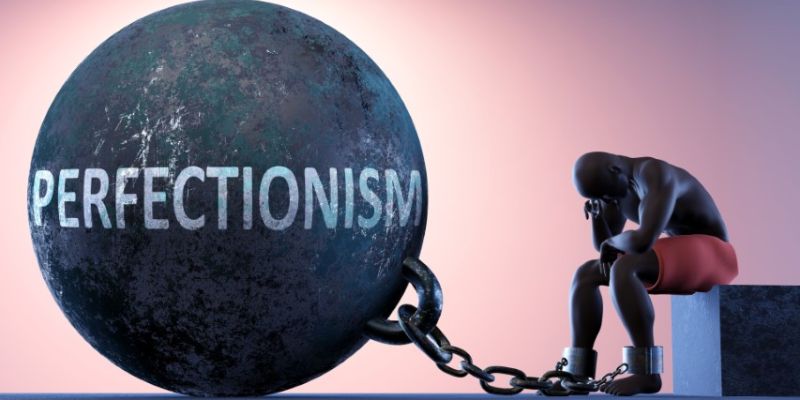In recent years, I’ve treated increasing numbers of individuals who are driven to distraction through their pursuit of perfection. The desire to be perfect traps and burdens many people and imprisons them with unrelenting stress, often creating havoc in their lives. This is a very curious thing, given that these same people believe that seeking perfection is desirable. Like many operating beliefs and assumptions, when we take a deeper look, they may appear nonsensical.
Perfection suggests a state of flawlessness, without any defects. To be perfect implies a condition whereby your action or performance attains a level of excellence that cannot be exceeded. Seeking perfection at a particular task might be achievable, and certainly a student can strive to attain a perfect grade or you can try to accomplish a perfect execution of something. You can hope to bowl 300 or produce a perfect report at work. You certainly hope your surgeon does a perfect job on your operation.
Yet, the goal of being perfect in life is altogether a different story. A machine or electronic device may operate perfectly — at least for a while. Yet, over time it will begin to wear down and require repair. The very notion of perfection is rooted in the paradigm of Newton’s mechanistic universe. Humans, however, were never intended to be perfect. That’s part of the definition of being human. Consider the expression, “I’m just human.”
In our culture we move relentlessly toward greater emphasis on achievement, productivity and goal attainment. We ask our children what their grade is, not what they learned. We tend to measure our lives in terms of success and achievement and lose perspective on what it may mean to live well. This tendency ruptures any sense of meaning or balance in our lives. We seem to lose the capacity for wonder and awe. Could you imagine looking at a magnificent rainbow and complaining that the width of one color was narrower than another? Not only would that be ridiculous, we’d also be ruining the splendor of the moment. And yet that is exactly what we do when we judge ourselves for our imperfections. We forget that as humans we’re part of nature, as well. As such, we would benefit if we came into acceptance of the natural flow of life, which by the way happens to be imperfect.
In truth, the notions of perfect or imperfect are simply constructs of mind and have no actual basis other than thought has created them. The notion of perfection has existed since ancient Greece, but in its more modern incarnation, it is a construct of Newton’s machine. It has no place, however, in a participatory worldview. We internalize this model of perfection and imbue upon it some intrinsic truth, and then may spend our lives wastefully pursuing that “truth.”
Ironically, if someone ever could achieve this implausible state of perfection, it’s likely that very few people would tolerate him or her. For the perfect individual would be a constant reminder to all others of their own shortcomings. Not to mention that they probably wouldn’t be much fun to be with. Who would really tolerate, let alone enjoy, being with someone who was inhumanely perfect?
When I speak on this subject –the problem with perfectionism — I find that people often protest that they are simply striving for excellence and may ask what is wrong with trying to improve. My response is – there’s no problem with that at all, if it’s done with balance. But must you always be striving to improve? If so, you are forever climbing the ladder reaching to the rung above you. You never reach your goal, there are always more rungs. So you’ll be happy when?
The paradox here is that to perpetually strive suggests that you may not be at peace and that actually impedes your forward progress. In other words, the balance that is derived from pausing from the inexorable improvement permits intuitive growth. When we experience being present in the moment, our personal evolution may vault forward. However, if we are ceaselessly pushing ourselves forward, we may actually impinge the very progress we seek. To be the “best you can be,” requires that you free yourself from being the subject of your onerous demands. The over emphasis on a highly productive life is reminiscent of Newton’s machine-like ideology. Machines are intended to be productive. Humans are designed in much more complex ways, in which productivity is an important part, but not the entirety of our purpose.
American culture is driven toward excellence and the mantra of doing the best you can requires a deeper examination. If we always value performance over tranquility or being present, we are sacrificing balance and a core value of what it means to be human. Emotional intelligence and relatedness may be sacrificed in the pursuit of excellence. A life well lived would necessitate a harmony of excellence, joyfulness, relatedness and peace of mind. When one element obscures another, a lack of equilibrium sets in.
A Mask for Insecurity
I have often counseled people who were beleaguered by their need to be perfect. I have come to learn that their pursuit of perfection is really a disguise for their insecurity. It becomes a statement that I’m not good enough just as I am. When we do that, we judge ourselves.
Usually we strive toward being perfect to compensate for a sense of inadequacy. People who want to be perfect usually have an exaggerated sense of their own shortcomings. They typically received messages earlier in life that they weren’t good enough. So they decided that only by being perfect would they be beyond reproach. With such an affliction we might look at perfectionism as a compensation for earlier life experiences –wave collapses — that corrupted someone’s well-being and self-esteem. As a compensatory response, the drive toward perfection is erroneously sought as a solution. Perfectionists tend to think that other people are somehow better or superior to them, so they need to be without flaw just to catch up. This is a terribly damaging myth.
Individuals who seek perfection are more sensitive to the judgments of others. In fact, these judgments are most often imagined. Everyone has an opinion, but elevating someone else’s opinion to the status of being a judge is really silly. After all, someone else can’t really judge you unless you confer upon him or her, the power of being a judge.
The only perfection is in being present, yet the perfectionist is never present
The closest thing to perfection is in the ability to be fully present. Without any distracting thoughts measuring or grading ourselves, we’re free to really be in the moment. It’s in that moment that we’re truly alive. Yet, the perfectionist isn’t typically present as they’re either busy critiquing the past and replaying their every decision or worrying about their future decisions. So you see the perfectionist is never really present. Isn’t that ironic?
The pursuit of perfection limits our ability to be present and literally robs us of the vitality of life. It is unachievable, unimaginable and frankly undesirable, so why pursue it? Your time would be far better spent in delving into how to transcend the insecurity that catalyzed the desire for perfection in the first place.
Analyzing, measuring and judging are the tools of the perfectionist. We might recall that these are the central tenets of Newton’s paradigm and as such we can see that perfectionism is symptomatic of that tired worldview.
Do not measure thyself!
In my work as a psychotherapist I often see individuals who are plagued by a relentless measuring of themselves. These people carry on an internal dialogue whereby their critical voice is enslaving, as they feel compelled to judge and measure most aspects of their lives. In such circumstances, these individuals rarely get to be present. Even when in conversation with others, they are only partly there, for a more private aspect is carrying on a self-critique at the same time. Their self-critical voice is embedded in a very deep and predictable groove.
Sometimes I learn that the inner dialogue actually speaks in the second person. Rather than speaking in the first person –“I” — the voice speaks even more critically by saying “You.” Rather than the thought, “I shouldn’t have done that,” you may say, “How could you have done that?” When this occurs I inquire as to who is actually speaking. There is literally a measuring voice in many people that becomes the critical second party. Sometimes this simply replicates the childhood experience of the critical parent. The greater problem is that the victim of the childhood abuse integrates the measuring voice as his or her own! I have never encountered the third person voice speaking approvingly to one’s self — only critically.
You can’t be in two places at the same time (except in cases of quantum entanglement) and you can’t engage two thoughts simultaneously. Every moment in which you measure or judge yourself is a moment you didn’t choose a better and healthier option. The state of potential is never reached. Peacefulness and mindfulness are never reached for the analyzing, measuring voice never relents. These are missed moments of valuable life experiences. If a significant percentage of your thoughts are self-critical, then indeed you have scripted that life experience for yourself. You are missing the rich experience of joyful life.
Just think about how this impacts your relationships. If you’re not present for yourself, how can you be for another? This is ruinous for relating to others. If you feel perturbed by your own discontent, it has untold consequences for your relations with others.
Learning how to liberate yourself from this groove of negativity is altogether achievable once you set the intention. The techniques described in my posts, “Stuck in the Groove,” and “Breaking Free from the Comfort Zone,” illuminate the method for coming out of the groove of old thoughts and feelings.
As a baseball fan, I’ve often been curious about those who sit in the stands with pencil and scorecard in hand. They make note of most every transaction of the game — a measuring if you will. Yet they miss the poetic elegance and flow of the game. If you measure yourself, you’ll miss out on the flow of life.
I’m not, however, proposing an anything goes attitude. There is a vast difference between the measuring analysis of our thoughts or a reflective self-evaluation. Evaluating is a gentler, and a subtler checking in, whereas the measuring makes a much deeper and incisive cut into the fabric of our being. Such measuring ruptures the integrity of our life experience and severs our greater participation in and with life. You cannot engage in the flow of life if you are mired in analytical self-measurement.
Listen to my recent Possibility Podcast, The Problem With Perfection.
Please be sure to “like” my Facebook page to see my quote of the day, follow me on Twitter, and join my LinkedIn network.





I wish to thank you Mel for sharing this article and point of view with us all – I could not agree with you more and I personally believe that this perception needs to be challenged to assist people in all walks of life to grow and see the opportunities of being present in our beautiful wide world in all its imperfect glory.
Once again thank you 🙂
My pleasure Suzanna
Blessed are the meek? It occurs to me that meekness, the quality of being open and teachable, is a way of being that foils the inner perfectionist. I see perfectionism beginning as an individual’s defense against unrelenting criticism. Eventually, the critic doesn’t have to say a word (they can even be dead), but the words live on. It’s like someone hits us with a hammer over and over – eventually they leave the scene – then WE pick up the hammer and start banging away at our own head!!
I like your points – I can see a perfectionist backing away from perfetcion to strive for excellence. A little bit of a shift at a time will make a huge difference.
Great topic – I deal with trichotillomania, skin picking, and other forms of deliberate self-harm. If the behavior is driven by perfectionism – the recovery process is often confounded by the need to “recover perfectly” the first try.
Hi Mary,
I try to approach the “critical voice” as a reflection of what our own voice is indeed saying to us. If we carry on our monologue in a judgmental and critical way, life becomes unbearable as there’s no relief. When another person is the critic we can shut them out,for a time at least. When we are the critic, there’s no escape.
What I have found very effective is working with people to help them see — and detach–from their thoughts.
Wonderful input and discussion – thank you all.
Comment for Business World/Leadership:
Human Synergistics promotes a Leadership Stile Indicator assessing 4 constructive, 4 passive and 4 aggressive stiles. I was first amazed then happy to learn that the Perfectionistic is defined as one of the aggressive stiles (team or organisational culture). The short definition reflects exactly this discussion (from
Perfectionistic:
Based on the need to attain flawless results, avoid failure and the tendency to equate self-worth with the attainment of unreasonably high standards. People high in this style are preoccupied with details, place excessive demands on themselves and others and tend to show impatience, frustration and indifference toward others’ needs and feelings.
Dear Mel,
The web was created for your super-insightful blogs! There’s another side of perfectionism that I have discerned in myself that inhibits my own efforts at excellence in pursuits that would enhance my life. I now believe that perfectionism is behind my procrastination in doing the things I would love to do, but since I may not get perfection, I fear putting in my all (or even anything at all, I just dream about completing creative and worthwhile projects). I believe, like many, I need to enjoy the journey and not be that concerned/worried about reaching the destination. When you enjoy the ride, the destination comes all too soon.
My question for the blog is as a parent or educator, how can you help a child or student in which perfectionist behaviors are apparent to feel unafraid to achieve excellence in more of a chilled fashion? How can I help them feel positive and self-accepting for just being themselves and to feel proud of their efforts to meet their challenges?
[…] me. I waste the opportunities of wonder, as psychologist Mel Schwartz explains in his post called “The Problem of Perfectionism”: In our culture we move relentlessly toward greater emphasis on achievement and goal attainment. […]